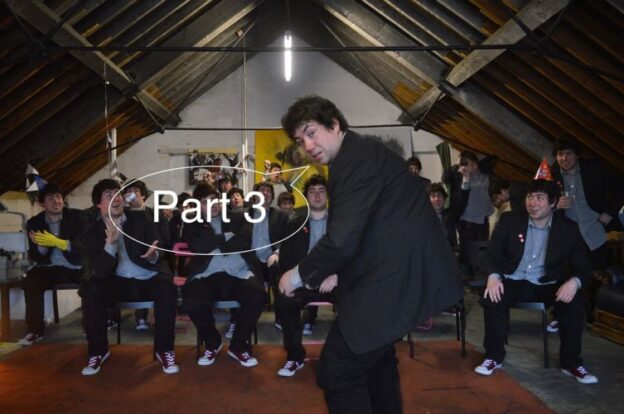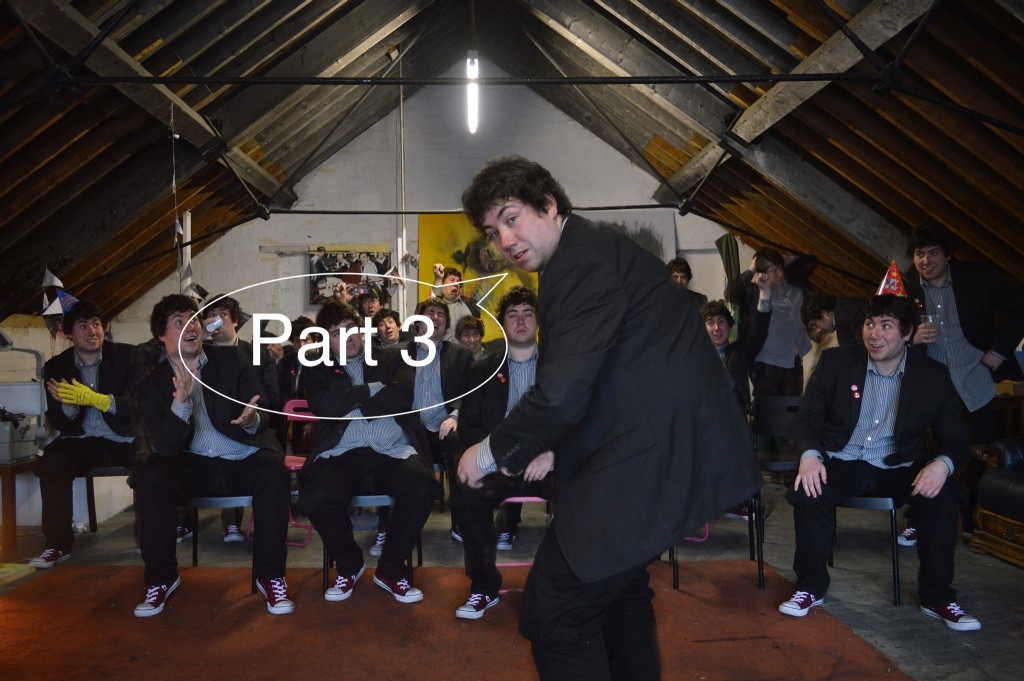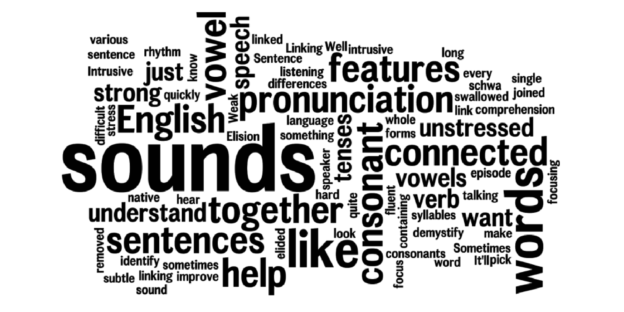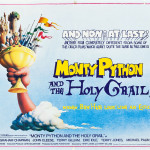Do you ever listen to songs and completely mishear the lyrics? I do it all the time. In fact, everybody does! Let’s listen to some song extracts in which the lyrics don’t quite sound as the singer intended.
![]() [DOWNLOAD]
[DOWNLOAD]
Jimi Hendrix – Purple Haze
Sounds like: “Excuse me, while I kiss this guy”
The real lyrics: “Excuse me while I kiss the sky”
The connection of ‘this’ and ‘guy’ makes the /g/ and /k/ sound almost exactly the same. In fact, I think “kiss this guy” and “kiss the sky” are identical.
Do you ever do Karaoke, see the song lyrics on the screen and realise you’ve been hearing all the words wrong, all these years? Or do you wonder if maybe the guy who did the karaoke subtitles didn’t have a perfect command of English and misheard all the lyrics?
Well, if you do often mishear lyrics, worry not – it’s really common and it happens to everyone! There are loads of songs like that for me. For years I thought Sting was singing about sausages in this song. Is it just me or is he singing about salami?
Of course, he’s actually singing “So lonely”.
So, let’s listen to some song extracts and try to understand exactly which words are being sung. Let’s see if you mishear them too, and we’ll consider why they might be easy to get wrong.
Misheard Lyrics
Jimi Hendrix – Purple Haze
Sounds like: “Excuse me, while I kiss this guy”
The real lyrics:
The connection of ‘this’ and ‘guy’ makes the /g/ and /k/ sound almost exactly the same. In fact, I think “kiss this guy” and “kiss the sky” are identical.
Nickleback – How You remind me
Sounds like: “cos little women must have damn near killed you”
The real lyrics: “because livin’ with me must have damn near killed you”
“With me” can sound like “women”. “wi’me”
“Living” can sound like “little” when you remember that the /t/ sounds are often softened in US English.
The Stone Roses – I Wanna Be Adored
Sounds like: “I wanna be a door”
Real lyrics: “I wanna be adored”
He’s really keen to be a door. Because the ending of the word trails off, it’s quite easy to imagine he’s not adding a /d/ sound at the end.
Leona Lewis: “Bleeding Love”. (1min)
Sounds like: “You call me your banana”
The real lyrics: ??
Duffy – Mercy
Sounds like: “You got me begging you for birdseed”
The real lyrics: “You got me begging you for mercy”
Eagles – Hotel California
“What a nice surprise, when your rabbit dies” (3.25)
The real lyrics:
Rolling Stones – Start Me Up
Sounds like: “In Yugoslavia you’ll never starve”
The real lyrics: “If you start me up I’ll never stop”
Sister Sledge – We Are Family
“Just let me staple the vicar”
?
“We’re giving love in a femidom”
?
Bon Jovi – Living on a Prayer
“It doesn’t make a difference if we’re naked or not”
“It doesn’t make a difference if we make it or not”
The /m/ in ‘make it’ can quite easily sound like an /n/ sound, and the /t/ in “make it” sounds like a /d/, so there you go…
Billy Ocean – When The Going Gets Tough
“You can go and get stuffed.”
“When the going gets tough.”
The beginning part of the phrase doesn’t work, but “and get stuffed” sounds pretty good!
“Gets tough” sounds almost exactly like “Get stuff”.
Miley Cyrus – Wrecking Ball
“I came in like a rainbow”
“I came in like a wrecking ball”
I think this is because she doesn’t sing it clearly, and the vowel sounds are the same. Also, when you stretch out a note, it’s usually a vowel sound and the consonant sounds might get shortened. Singing it with passion extends the vowels, and the consonants disappear into a slightly ambitious zone.
*Audible offer* www.audible.com/teacherluke
Creedence – Bad Moon Rising
“There’s a bathroom on the right.”
“There’s a bad moon on the rise.”
All the vowel sounds are the same. The rest is some imagination or perhaps some connected speech.
Deep Purple – Smoke on the water
“Small cousin Walter, is firing this guy.”
“Smoke on the water, fire in the sky”
There’s another example of “the sky” sounding like “this guy”.
“Fire in” sounds a lot like “firing”
“Smoke on the water” – you need a bit of imagination to hear “Small cousin Walter” but it’s there!
The Cars – Drive
“We can’t go on, thinking, nothing’s wrong – pork pie”
No idea what he’s actually singing…
Michael Jackson – You are not alone
“Your burgers are the best”
Again, I have no idea what he’s on about.
Celine Dion – My Heart does Go On
“I believe that the hot dogs go on”
“I believe that the heart does go on”
We use “does” for emphasis, or to insist something. In this case, it makes it sound like she’s singing about junk food.
Led Zep – Stairway to Heaven
“There’s a wino down the road”
“And as we wind on down the road”
The ‘d’ in “wind on” disappears as the /n/ sound and /d/ sounds fuse together with the same tongue movement.
Seal – A Kiss From A Rose
“and my eyes become lager…”
For me, it just sounds like he’s saying “lager”. I expect he wants to say “larger” but I think it’s definitely “lager”.
Air – All I Need
“Have a wank”
“How do I?”
Ok so she’s actually singing, “How do I?” but just a little bit of imagination for the /k/ at the end, and you’ll never be able to hear this song in the same way again.
Brian Adams – Summer of 69
“I got my first real sex dream”
“I got my first real six string”
Sometimes a /dr/ sound can be similar to a /tr/ sound, especially when they follow a /ks/ sound, like in “six”. So, “six string” can sound like “sex dream”.
Alicia Keys – New York
“New York – Concrete Jungle Wet Dream Tomato”
“Concrete jungle what dreams are made of”
It just sounds like “wet dream tomato” to me. Why is she singing that?
Ray Parker Junior
“Who you gonna call? Those bastards!”
“Ghostbusters”
The vowel sounds are pretty similar, and the emphatic way it is said. They all contribute to a funny misunderstanding!
Eiffel 65 – I’m Blue
“I’m blue I will pee on a guy, if I was green I would die.
I think they’re just singing nonsense and the human brain tends to impose order on nonsense, so your brain searches for meaning. This is the closest your brain can come up with. For me, it improves the song immeasurably.
Beastie Boys – Intergalactic
“I’m having a big shit, I’m having a big shit…”
“Another dimension”
The /th/ in “another” can sound like a /v/ sound, and the /shun/ sound in “dimension” can easily sound like “shit”.
Shania Twain – That don’t impress me much (2.20)
“I can’t believe you kiss your cock at night”
“I can’t believe you kiss your car goodnight”
“Car goodnight” can easily sound like “cock at night” because the /g/ of “goodnight” can sound like the /k/ in “cock”, and then “goodnight” sounds like “at night” because of the old /d/ /t/ thing between “good” and “at”.
Anyway, no need to explain it. Just enjoy it!




















